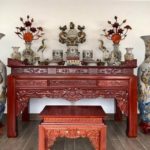As the Lunar New Year approaches, many Vietnamese families prepare by cleaning their homes, with special attention given to the ancestral altar. This act of cleaning is considered a sacred ritual, and there are specific traditions and timings to follow when it comes to preparing the altar for the Kitchen God ceremony. Let’s explore the ins and outs of this practice in the article below.
1 When is the Best Time to Clean the Ancestral Altar – Before or After the Kitchen God Ceremony?
There is a common belief among Vietnamese people that the Kitchen Gods return to heaven from the 23rd of the twelfth lunar month to the 30th of the last lunar month. As the Gods are not physically present on the altar during this time, it is considered an opportune moment to give it a thorough cleaning. By doing so when the Gods are not in residence, one avoids any potential disrespect and ensures good fortune for the household.
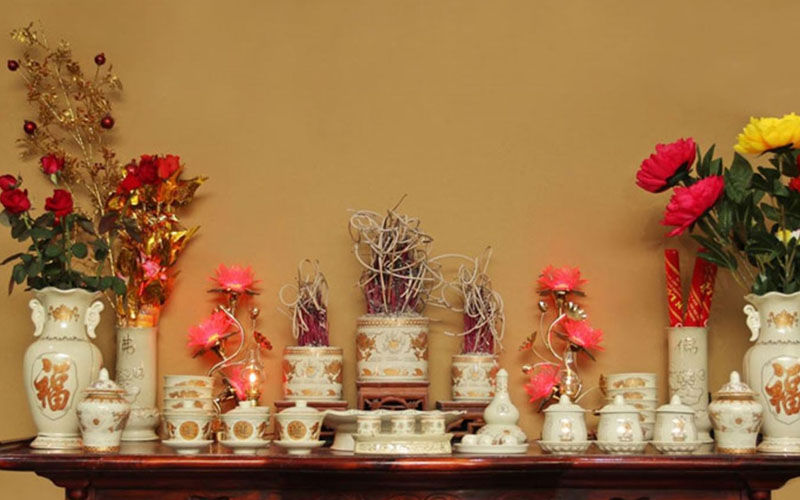 Regular cleaning keeps the ancestral altar pristine
Regular cleaning keeps the ancestral altar pristine
However, from a scholarly perspective, this belief may not be entirely accurate. The ancestral altar is a sacred space, brimming with spiritual energy, and it is important to maintain its cleanliness and dignity throughout the year. One need not wait for a specific date, like the Kitchen God ceremony, to tend to this important task.
For further reading: A Comprehensive Guide to the Kitchen God Ceremony 2024
2 The Most Auspicious Time to Clean the Ancestral Altar After the Kitchen God Ceremony
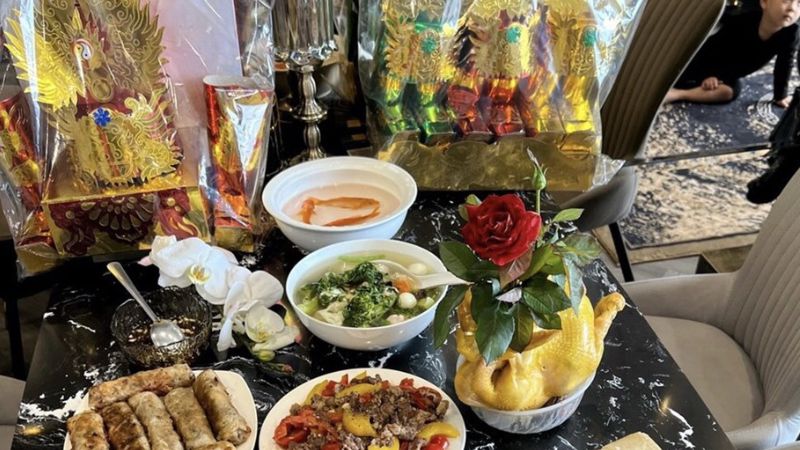 The best time to clean the ancestral altar after the Kitchen God ceremony
The best time to clean the ancestral altar after the Kitchen God ceremony
Annually, on the 23rd of the twelfth lunar month, the Kitchen Gods, or Ong Cong and Ong Tao, ride a carp to heaven. Thus, it is customary to perform a ceremony in the morning to bid them farewell. Following this, one can proceed to clean the altar, either in the morning or afternoon of the same day.
The most favorable times to undertake this task are from 8 am to 11:55 am or 1 pm to 5:55 pm, avoiding the noon hour. If, for some reason, you plan to hold the Kitchen God ceremony in the afternoon, it is advisable to clean the altar on a different auspicious day, as evening cleaning is not recommended.
According to feng shui experts, the period after the 23rd of the twelfth lunar month is ideal for altar cleaning. However, as long as one approaches the task with sincerity and reverence, any time of the year is suitable for tending to the ancestral altar.
3 The Proper Way to Clean the Ancestral Altar
Seek Permission Before Cleaning
In keeping with traditional practices, one should prepare an offering plate to place on the altar before commencing the cleaning ritual. It is customary to bathe, dress respectfully, and burn incense to ask for permission to proceed with the cleaning.
 Seek permission before cleaning the ancestral altar
Seek permission before cleaning the ancestral altar
When praying, one should respectfully request that the deities and ancestors temporarily withdraw to allow for the cleaning process. During the cleaning, it is essential to be cautious, attentive, and meticulous to avoid any damage to the altar and its contents.
Note: It is advisable to wait for the incense to burn out completely before beginning the cleaning.
Prayer for Cleaning the Ancestral Altar:
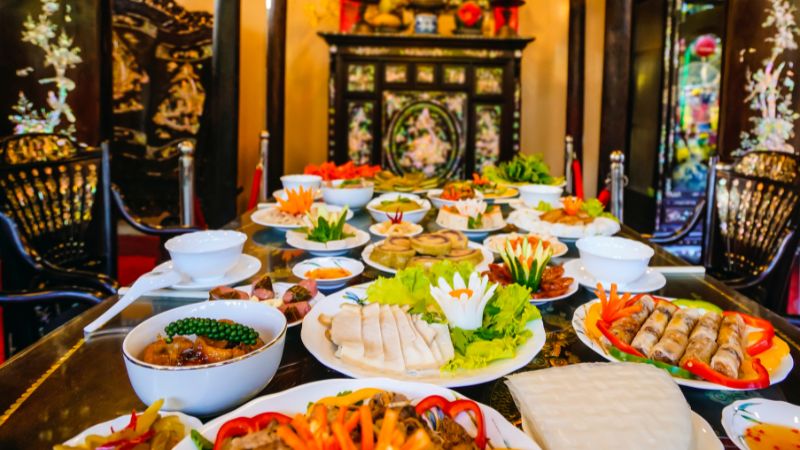 Prayer for cleaning the ancestral altar
Prayer for cleaning the ancestral altar
Nam Mo A Di Da Phat!
Nam Mo A Di Da Phat!
Nam Mo A Di Da Phat!
My name is: ………………………
I reside at: ……………………………
Today, on the … day of the … month in the … year, I recognize my shortcomings in maintaining the cleanliness of the ancestral altar. I sincerely repent and seek forgiveness.
I respectfully inform the deities and ancestors (depending on the type of altar) that I have chosen an auspicious day to perform a ritual cleaning of the altar to restore its dignity and purity. I humbly request your permission and blessings for this undertaking.
May you guide me in performing this task with diligence and precision, ensuring the altar is immaculate and properly aligned. May our ancestors find peace, and may our home be blessed with prosperity.
I am but a humble human, prone to mistakes and errors. I pray for your forgiveness and ask that you overlook any unintentional transgressions.
(Bow three times.)
Prepare the Necessary Cleaning Tools
The required tools for cleaning the ancestral altar are: a soft cloth and a broom made of natural materials. The water used for cleaning should be infused with five specific herbs: agarwood, sandalwood, cinnamon, star anise, and eucalyptus, or plain white wine to purify and cleanse the altar. These herbal waters must be heated beforehand, and one should never use cold water for this purpose.
 Use a copper incense burner and aged wine to maintain cleanliness
Use a copper incense burner and aged wine to maintain cleanliness
Additionally, prepare a clean table to temporarily place the incense burner, ancestral tablets, and deities. Keep them separate to avoid confusion, and ensure they are free from dust before returning them to the altar.
The Sequence for Cleaning the Ancestral Altar
Spiritual advisors suggest cleaning the altar from top to bottom. When wiping statues, use a soft cloth to avoid damaging the paint or causing scratches. For statues made of copper, refrain from using alcohol or wine, as these can cause oxidation and discoloration.
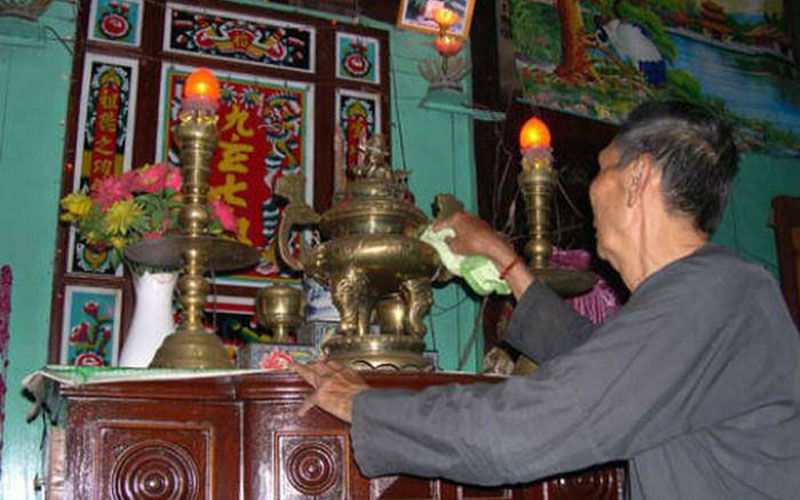 Clean the ancestral altar from top to bottom
Clean the ancestral altar from top to bottom
Try to avoid moving the ancestral tablets and incense burner during the cleaning process, as this can disrupt the connection and diminish the sincerity of your intentions, bringing bad luck to the household.
It is advisable to remove the incense ash during cleaning to maintain a tidy altar. Once the cleaning is complete, replace the water in the flower vase and offering cups. If the flowers have wilted, replace them with fresh ones, and return the statues to their original positions.
Afterward, light three incense sticks and invite the deities to return to the altar.
4 Important Considerations When Cleaning the Ancestral Altar
- Approach the cleaning with reverence and sincerity so that your ancestors may bear witness to your devotion.
- Avoid moving the ancestral tablets and incense burner during the cleaning. If an accidental shift occurs, perform a repentance ritual and restore them to their original positions.
- Use separate brooms and cloths for the altar, distinct from those used elsewhere in the home. Alternatively, you may opt to purchase new ones specifically for this purpose.
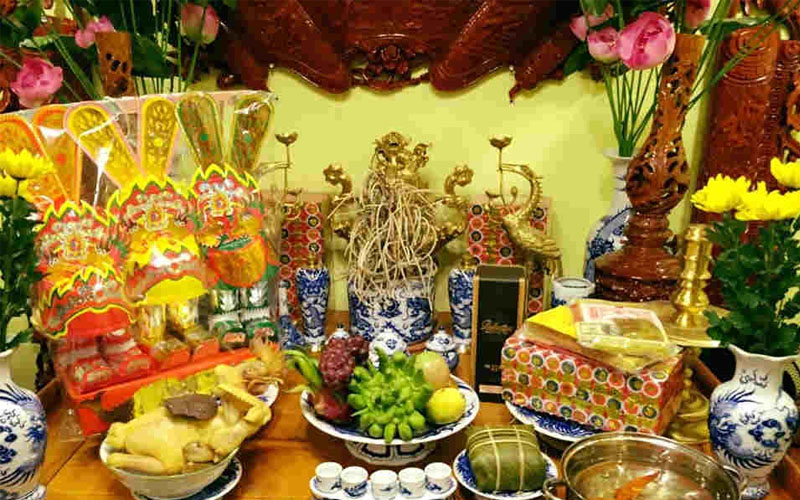 Important considerations when cleaning the ancestral altar
Important considerations when cleaning the ancestral altar
As the new year approaches, families take great care in cleaning their ancestral altars, ensuring both cleanliness and spiritual harmony. By following these traditions, families seek the blessings of their ancestors, inviting good fortune and prosperity into their homes. May this information guide you in your own preparations!



























